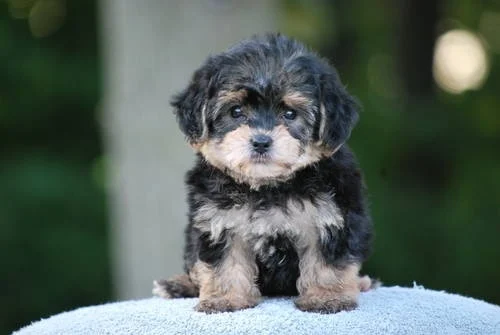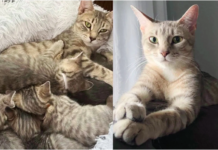Last Updated on September 16, 2023 by Fumipets
The Yorkshire Terrier & Bichon Frise Mix: A Delightful Designer Dog
The Yorkshire Terrier and Bichon Frise mix, often affectionately referred to as the “Borkie,” is a charming designer dog breed that combines the best traits of both its parent breeds.
This crossbreed is known for its small size, affectionate nature, and lively personality, making it a popular choice for families and individuals seeking a lovable companion. In this article, we will delve into the key characteristics, care tips, and frequently asked questions about the endearing Borkie.
Yorkshire Terrier & Bichon Frise Mix
The Yo-Chon could be the perfect little dog for you if you’re seeking one with charm and sass to spare! This hybrid dog is a mix between the cheerful Bichon Frise and the Yorkshire Terrier, the smallest of the terrier breeds.
Breed Overview
Height: 9-12 inches
Weight: 6-8 pounds
Lifespan: 10-12 years
Colors: Black, blond, brown, cream, gray, white, and combinations of these colors
Suitable for: Individuals and families looking for an allergy-friendly, adaptable, and playful dog
Temperament: Active, playful, curious, independent
Despite their small stature, these canines are bursting with character, energy, intelligence, and curiosities. The Yo-Chon is a great companion for seniors or those who live in apartments since it is easily adapted to life in practically any kind of housing arrangement. Continue reading to find out more about what it’s like to coexist with and be adored by the cute Yo-Chon!
Yo-Chon Puppies
Yo-Chon pups are well-liked by families and people who live in compact apartments because of their cute appearance, friendly temperament, and tiny stature. Yo-Chons often get along well with kids, other pets, and strangers and are pleasant and social creatures. They are also renowned for their intelligence and trainability, which make them excellent partners for agility, obedience, and other dog sports.
If you want to adopt a Yo-Chon, look into local shelters or rescues. Rescue organizations that specialize in Yorkies or Bichons often accept mixed breeds like the Yo-Chon. Adoption costs may vary and often include services like vet visits, vaccinations, or spay/neuter operations.
Temperament & Intelligence of the Yo-Chon
The temperament of the Yo-Chon, a hybrid between two breeds, may resemble that of a Bichon Frise, a Yorkie, or a combination of the two. A Yo-Chon is likely to be intelligent, vivacious, and maybe even possess some attitude. Although they might be obstinate, they are often endearing and kind to everyone they encounter. To prevent any size-related aggression concerns, Yo-Chons, like other little dogs, need socialization and training from a young age.

Are These Dogs Good for Families?
Yo-Chons are often outgoing, sociable canines who get along well with kids. However, young, hyperactive children might easily damage them due to their size. If you have young children, keep an eye on Yo-Chons or wait till they are older before bringing a puppy home.
Yo-Chons are often independent canines, although they don’t like to be left alone all the time. The Yo-Chon may not be the greatest choice for active families that spend a lot of time outside the home. Yo-Chons are remarkably destructive when they want to be, given their size. Yo-Chons who are lonely or bored will undoubtedly express their sentiments.
Does This Breed Get Along with Other Pets?
When properly socialized, Yo-Chons often get along with other canines. Small dogs are infamous for acting much larger than they really are and for causing problems that larger dogs can’t handle. Make sure your Yo-Chon is properly socialized from a young age, and monitor their relationships with other canines.
Despite their tiny exterior, Yorkshire Terriers were developed as rat hunters and have the prey drive to prove it. This predatory urge may be inherited by Yo-Chons, and some may pursue cats or other small animals. When bringing a cat into a home where a Yo-Chon lives, proceed with a bit extra caution. A Yo-Chon should not be maintained with little exotic pets; if you must, make sure they are kept apart.
Things to Know When Owning a Yo-Chon:
Are you prepared to adopt a Yo-Chon into your family? What you need to know about caring for this designer dog is provided here.
Food & Diet Requirements
Any dog food that is nutritionally balanced should be suitable for your Yo-Chon. If you want to prepare homemade dog food, be sure to consult your veterinarian beforehand. They can assist you in selecting the proper components and ensuring that you include all essential vitamins and minerals.
Allergies, especially food allergies, are common in bichons. You may need to modify your Yo-Chon’s diet if they inherit this propensity, so follow your veterinarian’s advice. To prevent your Yo-Chon from becoming fat, watch how much you feed them.
Exercise
Yo-Chons are often very lively and active canines. They need regular activity, but because of their little stature, it takes less work to exhaust them than it would a large, active breed. Yo-Chons are a well-liked option for apartments or city life since they don’t need a yard to exercise.
Regular mental stimulation is just as crucial to a Yo-Chon as physical activity. They are intelligent, inquisitive canines who love to explore. Toys that are difficult for kids to use, regular training sessions, and other mental-exertion-promoting activities should be provided.
Training
Because of their terrier pedigree, Yo-Chons are sometimes a bit independent and headstrong. In the 18th century, Bichons were common street performers in Paris. Yo-Chons are often intelligent canines with a variety of temperaments that may learn rapidly, but they may also try your patience at times.
For the greatest success while teaching your Yo-Chon, keep training sessions brief, entertaining, and encouraging. Do not assume that since they are little you can avoid spending time socializing or training them. Many little dogs experience aggressiveness or other behavioral disorders as a consequence of this condition, which is frequent among owners of small dogs.
Yo-Chons might sometimes take a little longer to teach to go outside than some other breeds. They may bark a lot and are quite vigilant tiny dogs, raising the alarm at the least sign of unease, as we’ve previously indicated. Particularly if you are in an apartment, you may often need to instruct your Yo-Chon to stop barking inconveniently.
Grooming
Yo-Chons may have coats that are more straight and fine like a Yorkie, or more curly like a Bichon, or something in between. The Yo-Chon is regarded as a more allergy-friendly breed since both parent breeds are often well-tolerated by those with dog allergies, despite the fact that no dog is totally hypoallergenic.
Yo-Chon coats need brushing two to three times a week to prevent tangling or matting. Additionally, they often need visits to the groomer to have extra hair removed or trimmed.
The dental issues that Yo-Chons often have are common in little canines. For this breed, regular tooth brushing or the use of other dental cleaning solutions advised by your veterinarian is essential. Their nails should be kept short, and you should periodically inspect and wipe out their ears.
Health and Conditions
Yo-Chons might acquire any of the hereditary health issues that Bichons or Yorkies have due to their mixed heritage. Pick a breeder that has their dogs’ health verified and evaluated in order to get the healthiest puppy possible. The following illnesses are ones to watch out for in your Yo-Chon.
Minor Conditions
Cataracts
Allergies
Serious Conditions
Luxating patellas.
Hip dysplasia
Bladder stone
Cushing’s disease

Male vs Female
men and women Yo-Chons are comparable in terms of size, look, and degree of care. Males may sometimes be a bit more extroverted or dominating, however neutering normally calms them down. Unless they are spayed, females will go into heat at the age of six months and then twice a year after that.
The best course of action is to get your Yo-Chon spayed or neutered if you don’t want to breed them. When choosing a male or female Yo-Chon, keep in mind that spaying is often the more costly of the two surgeries.
3 Little-Known Facts About the Yo-Chon
1. They have several different names.
In addition to Yo-Chon, this crossbreed may also be referred to as a Borkie, Yorkshire Frise, or Yorkie Bichon.
2. Their origins are unknown.
The Yorkshire Terrier dates to the middle of the 19th century, whereas the Bichon Frise dates to the 13th century. However, the purposeful blending of the two breeds had a far more obscure beginning. Although the designer dog fad is just a few decades old, it is unknown when the Yo-Chon initially started to be made. However, it probably wasn’t that long ago.
3. They don’t believe in being seen but not heard.
Despite being little canines, Yo-Chons have a lot to say. If you want to maintain one of this breed as an apartment dog, you should definitely take into account that they are notorious for being rather noisy.
Conclusion
Some dog lovers are adamant large dog owners, while others would only consider a tiny breed. In a more compact, apartment-sized form, the Yo-Chon provides a big dog attitude. The Yo-Chon is a little but formidable contribution to the world of designer canines, being able to live practically anyplace with almost anybody, even those with allergies. Even so, little animals need a lot of care, so be sure you’re ready to give your Yo-Chon the time and attention they deserve.
Questions and Answers About the Yorkshire Terrier & Bichon Frise Mix:
What are the typical physical traits of a Yorkshire Terrier & Bichon Frise mix?
Borkies are small dogs with a compact body, expressive eyes, and a plush, often curly coat. They inherit a blend of traits from both parent breeds, which can result in a variety of coat colors and patterns.
What is the temperament of a Borkie?
These mixed-breed dogs are known for their affectionate and friendly disposition. They tend to be outgoing, social, and enjoy spending time with their human companions. Borkies are also intelligent and can be easy to train.
How should a Borkie be groomed and cared for?
Due to their often curly and dense coat, regular grooming is essential for a Borkie. This includes brushing to prevent matting, regular baths, and routine nail trimming. Additionally, dental care and ear cleaning should be part of their grooming routine.
What is the size of a fully grown Yorkshire Terrier & Bichon Frise mix?
A Borkie typically stands between 9 to 12 inches tall at the shoulder and weighs between 6 to 12 pounds, with females often being slightly smaller than males.
Are there any specific health concerns for the Yorkshire Terrier & Bichon Frise mix?
As with any mixed breed, Borkies may inherit health issues from their parent breeds. Common concerns may include dental problems, hip dysplasia, and certain genetic conditions. Regular veterinary check-ups and a healthy diet can help address and prevent potential health issues.
https://www.youtube.com/watch?v=7k9YqhMNouY


















